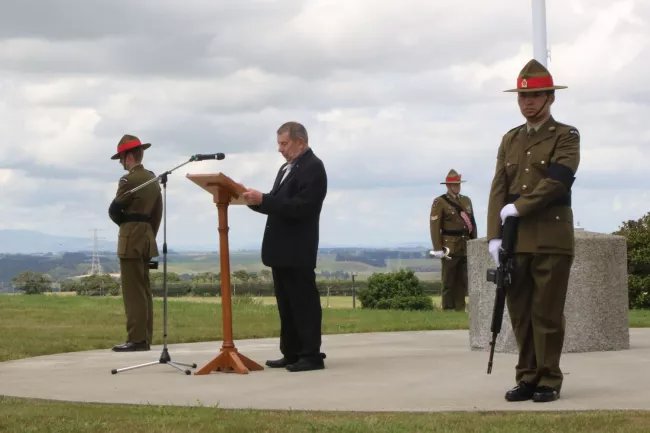Unveiling ceremony held to bless previously unmarked graves of World War veterans
February 20, 2023

Earlier this month, Mayor Andy Watson attended a ceremony to bless the previously unmarked graves of more than 30 servicemen who died while at the old Lake Alice Psychiatric Hospital.
The final resting places of 34 WWI and WWII veterans were discovered by Marton RSA life member Barry Rankin after being asked to track down one serviceman’s grave in 2016.
A number of servicemen died at Lake Alice Hospital between 1950 and 1999, and they were usually buried in Mount View Cemetery, many in unmarked graves.
The commemoration at Mount View Cemetery took place with the support of the NZDF, Marton RSA , Rangitīkei District Council, and Veterans' Affairs New Zealand, which funded the gravestones and plaques.
Mayor Andy said it was an incredibly moving event and an honour to be a part of - you can read more about his experience below.
“We were incredibly fortunate that the day was one of bright sunshine. I arrived at Mt View reasonably early to find the Army already erecting their marquee with personnel ready to stand at each individual grave. To walk along and see the 34 graves covered with flags before the ceremony commenced was quite poignant.
There were a number of dignitaries present and what struck me first of all was the presentation that Barry Rankin gave about his personal voyage in discovering the number of unidentified graves. These were military personnel who after returning from the World Wars were residents at Lake Alice Hospital and basically forgotten. When they died they were buried at Mt View Cemetery with makeshift markers that over time disintegrated and those graves were effectively left unnamed for many years. It was an incredibly moving story and I think everybody was astounded at the work that Barry had done in recognition of those soldiers’ final resting places
Each of the 34 graves has now been suitably fitted with a military plaque. After the official ceremony I was given the opportunity to stand and listen to some of the individual soldier’s stories which were fascinating. I happened to be at the unveiling of Sergeant Leonard Hardcastle’s grave, a soldier who was involved in field action near Ypres in 1917 where a near miss high explosive shell buried him up to his neck leaving him alone and unable to dig himself out. He lay out for three days and was delirious when he was finally brought in. He suffered permanent physical injury and returned to New Zealand suffering incredible mental stress. There were also soldiers who falsified their ages in their military records so that they could enlist on what they saw as the Great Adventure in 1914 and if that was a sample of all servicemen at the time it indicates the enormous amount of young people who left New Zealand and who shouldn’t really have been eligible to serve.
To hear these stories from the military records Barry was able to obtain was raw and emotional and as the RSA would say “lest we forget”.
